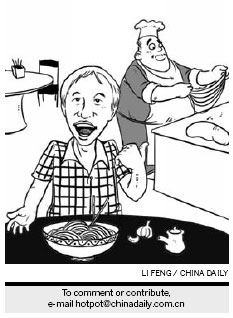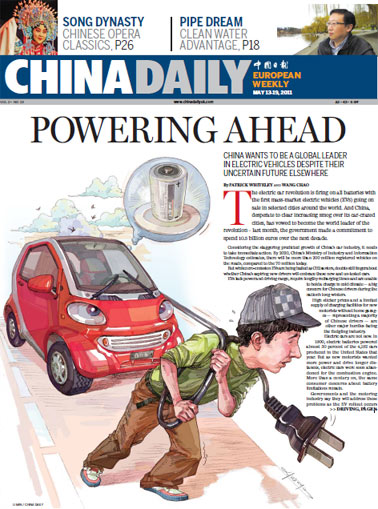View
A delectable question about local dining to noodle over
Updated: 2011-05-12 07:56
By Karl Arney (China Daily)

Eating out in China can require a level of self control and patience that is strange and challenging to the American diner.
You may think I say this in regards to rules of etiquette, but you would be wrong. Instead, I'm talking about simply being able to save room for some of the invariably best food that is brought out.
When I first arrived in China I was treated to more banquet dinners than I had attended the rest of my life. Given their fancy nature, I wasn't surprised that I often found myself struggling to make it to the end before becoming full.
It was when the banquets became less frequent and I began to more fully explore the food scene of Henan's provincial capital Zhengzhou that I realized this problem did not end with banquets. Only now it wasn't a few slices of watermelon I was trying to make it to, but rather the delicious, more filling hui mian.
Hui mian are wide, hand-stretched noodles that Zhengzhou takes pride in the same way most cities do with their signature foods. You can get hui mian soup whenever you want, but I generally feel they're most enjoyable accompanying other meals.
Zhengzhou has no shortage of places that provide them. The problem is that they always seem to show up late to the party.
Take hot pot - the dining method this column is named after - which is certainly not unique to Zhengzhou. In my experience, eating hot pot is a veritable marathon of paper-thin lamb and beef, shrimp and meat balls, tofu, eggplant, multiple types of mushroom, a few other vegetables, and, once, an unfortunate few goat eyeballs.

It all seems pretty light, but by the end it proves a stuffing experience. It's just around the time you're realizing this that employees bring out large sheets of hui mian dough, which they casually separate into large noodles and present to your table.
They're so good - and, after an hour of the other stuff plus the prerequisite beer and occasional baijiu, there's rarely much room left to enjoy the late additions. I've seen locals push themselves too far and need to go bolting out the door to vomit all over the street. I'm sorry, but I don't like the noodles that much.
Hot pot is hardly the only source for inconveniently timed hui mian goodness, though. Another great way to experience it comes in the form of da pan ji (big plate chicken).
Da pan ji is originally from Xinjiang, but Zhengzhou has adopted the dish as if it were its own. Its simple name fits the meal perfectly - it's a whole chicken chopped up and served with potatoes and spicy sauce on a big plate. It's very tasty as long as you can handle the spice, which even at "low levels" is formidable.
Noodles are traditionally brought out toward the end of the meal, and in Zhengzhou, the noodles take the form of hui mian. Now, on top of being full, you also have a mouth that is likely on fire from all the spicy sauce you've taken in along the way, and the noodles are put into that same sauce.
This all proves a true test of your priorities and will - do you want the noodles enough to further stuff your stomach and torch your mouth? This is a question every man must find his own answers to.
At this point you might ask: "You know it's coming - why don't you just pace yourself better?" But that would mean missing the fun of the challenge, and hui mian tastes best when it comes as a reward - even if I only have room for one bite.
For China Daily
E-paper

Green works
Wuxi becomes 'test case' for facing country's environmental challenges
The global rise of Chinese brands
China-EU trade on solid ground
ZTE banks on innovation
Specials

The song dynasty
There are MORE THAN 300 types of Chinese operas but two POPULAR varieties are major standouts

Cut above the rest
One of the world's oldest surgeons has performed more than 14,000 operations

From the ground up
Architect of Guangzhou Opera House has many projects under way, including 2012 Olympics.
